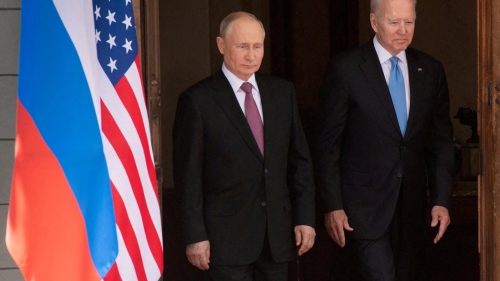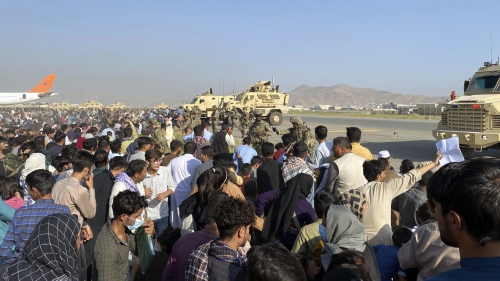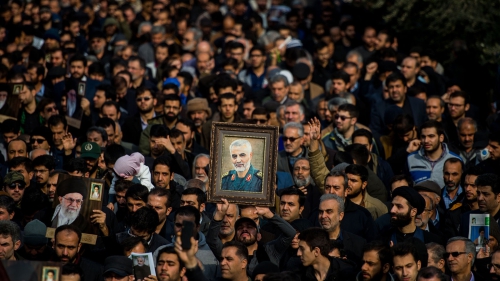The USS Cole and the other untold tragedies
As we watch the bodies of American sailors return home and await the latest reports on the investigation of the explosion on the USS Cole, we may feel an overwhelming sense of frustration. The American media, in their rush to provide the most comprehensive coverage of the bombing have overlooked a key element to the story.
Newspapers and the television news networks have only briefly mentioned the fact that these sailors were on their way to enforce sanctions on the Iraqi people. But the American public will never hear the deadly effect these sanctions have had on more than a million innocent men, women, and children.
Instead, we will only hear the stories recounted by family members of those sailors killed in the explosion. We will see the anguish in the faces of those who still await word on their missing sons, brothers, husbands and fathers. We will see photographs of the dead and hear about hopes, aspirations and dreams that were dashed on that fateful day. We will look on as the injured hobble off military planes and on stretchers with the assistance of medical personnel. We will receive live reports of somber memorial services, some of which will be broadcasted in their entirety.
This morning, the NBC today show conducted a live interview with Randy Kafka, an injured sailor from the USS Cole. He openly wept as he spoke of the men he worked and played with on that ship. He made the point that these men died serving their country.
Certainly, these men did put their lives at risk to enforce U.S. policies abroad. But what about the people who have died as a result of the U.S. led sanctions? Most of those who have died in Iraq did not have the choice of serving their government because they were under the age of five.
But we will never hear about their tragic stories. Not one single funeral will be covered by an American television network, and we may never see a photograph of any Iraqi who died as a result of the sanctions. These are stories that are undoubtedly more tragic and heartbreaking and must be told.
It is doubtful we will here live interviews any time soon from Veterans for Peace, former soldiers who know about the tragedies in Iraq and have launched a signature campaign to see an end to these deadly sanctions.
We will not hear from the numerous groups of American delegates who were firsthand witnesses to the horrors in Iraq. We will not see the tears of mothers who lost their children to diarrhea and malnutrition because water purification plants have been destroyed and chlorine for water purification is banned by the sanctions.
We may never see the images of Iraqi children who are packed four to a desk in classrooms with broken and missing windows. It is a little known fact that glass and other spare parts have become a scarcity over the last ten years.
It is a shame that journalists have not taken the lead in questioning the U.S. policy toward Iraq. The stories would be easy to tell. Reporters wouldn't have to walk far to get their stories in the streets of Baghdad and Basra, where electricity is available only three hours a day, even when temperatures soar well over 110 degrees.
So why has this tragedy of epic proportions been ignored? U.S. journalists have failed to provide fair coverage because of an inherent bias that systematically leans toward the U.S. government. It is doubtful that any of these White House correspondents, who arrive in their White House offices and enjoy the luxuries of traveling with U.S. officials both domestically and abroad, have gone beyond their inner circle of Washington's elite power structure to get their news. Many American journalists are unwilling or perhaps unable to go beyond the daily diet of government news conferences, news releases and spin doctoring. More and more, these journalists are sounding like government spokespeople. Although Clinton faced a litany of reports about his sexual behavior involving a White House intern, little has been done to question him on more serious issues, particularly his Administration's hypocritical policies toward the Middle East.
There have been a few exceptions. Perhaps the most memorable one was an interview with Madeleine Albright in May of 1996 on the popular television news program "60 minutes." When asked whether the cost of the lives of over half a million children was worth it in order to get rid of Iraq's President, Secretary of State Madeleine Albright, then US Ambassador to the UN, replied "It's a hard decision...but we think the price...is worth it."
Unfortunately few reporters from major news organizations have done much more before or since then to question the Administration's policy toward Iraq.
Secretary of State Madeleine Albright and her State Department cronies will argue that the sanctions will only help Iraqis rid themselves of a ruthless dictator. However, the last ten years have shown that such a strategy has failed. How many more innocent children must die before the American media will awaken?
The policies of the U.S. government are not unlike those of the Nazis who surrounded Leningrad during a three-year siege in which more than half a million people died a slow death of starvation. Like the Americans in Iraq, the Nazis used their formidable air force to ensure that supply lines to Leningrad remained cut off. It is the duty of journalists to remind the American public of this horrific chain of events as history repeats itself.
Undoubtedly there will come a day when the American public will realize our leadership failed to provide a just and equitable end to this ongoing crisis. Perhaps there will also be a day when journalists realize their deafening silence was a form of complicity.
(Hebah Abdalla is editor of iviews.com.)

















